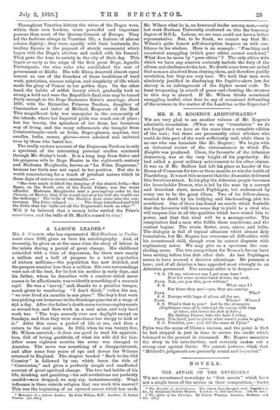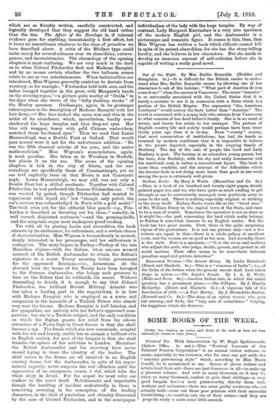NOVELS.
THE AFFAIR OF THE ENVELOPE.t
WE are accustomed nowadays to " first novels" which have not a single trace of the novice in their composition,—books • The Knights of Aristophanes. The Greek Text Revised, with Tssaislation t.e., by Benjamin Bickley Rogers. London G. Bell and Sons. [10s. &I. net.] t The Affair of the Envelope. By Eirene Wigram. London : Methuen and Co. [Cs.] which are so fluently written, carefully constructed, and logically developed that they suggest the old hand rather than the tiro. The Affair of the Envelope is, if internal evidence goes for anything, unmistakably a first effort, but it bears no resemblance whatever to the class of primitiat we have described above. A critic of the Bludyer type could make merry for several columns over its absurdities, extrava- gances, and inconsistencies. The chronology of the opening chapters is most confusing. We are very much in the dark as to when Colonel Fitzharden first met Madame Rampini, and by no means certain whether the two ballroom scenes relate to one or two entertainments. When technicalities are introduced, Miss Wigram generally contrives to deviate from accuracy, as for example : "Fitzharden held both oars, and the ladies lounged together in the prow, with Margaret's hands on the steering ropes,"—a picture quite worthy of " Ouida " in the days when she wrote of the " lofty slashing stroke " of the Henley oarsmen. Ouidaesque, again, in its grotesque extravagance is the description of Madame Rampini with her hair down :—" Her face looked the more wan and thin in the midst of its abundance, which, nevertheless, hardly over- shadowed the huge temples and blue deep-set eyes. Her blue silk wrapper, heavy with gold Chinese embroidery, matched those far-famed eyes." Then we read that Lance Mannersleigh was a Double First at Oxford. That would pass muster were it not for the unfortunate addition : "He was the fifth classical scholar of his year, and the senior mathematician." Miss Wigram's nomenclature, again, is most peculiar. She takes us to Wroxham. in Norfolk, but places it on the sea. The scene of the opening chapters is laid in the city of Siesta, and the sur- roundings are specifically those of Constantinople, yet we are told explicitly later on that Siesta is not Constanti- nople. Lance Mannersleigh, we may add, was not only a Double First but a skilled mechanic. Together with Colonel Fitzharden, he had perfected the famous Fitzharden. car. " It was worked by petrol, though Fitzharden had wanted to experiment with liquid air," but "though only petrol, the car's success was acknowledged in Paris with a gold medal." The book cries out for the editorial blue pencil—e.g., Fitz- harden is described as throwing out his ideas, " casually, in well turned, disjointed sentences"—and the pruning-knife, and the misprints argue most inadequate proof-reading.
Yet with all its glaring faults and absurdities, the book attracts by its exuberance, its enthusiasm, and a certain charm of characterisation. Miss Wigram is tremendously in earnest, deeply interested in her personages, and her enthusiasm is contagious. The story begins in Turkey—Turkey of the late Hamidian regime—with the failure, when success seemed assured, of the British Ambassador to obtain the Sultan's signature to a secret Treaty securing better government for the oppressed Istarians,—i.e., Armenians. At the eleventh hour the terms of the Treaty have been betrayed to the German Ambassador, who brings such pressure to bear on the Sultan that he withholds his assent. Without descending to details, it is enough to say that Colonel Fitzharden, the brilliant British Military Attache who has taken a leading part in the negotiations, is in love with Madame Rampini, who is employed as a nurse and companion in the haremlik of a Turkish Prince who stands very near the throne. Madame Rampini is half Istarian, and her sympathies are entirely with her father's oppressed com- patriots ; but she is a Turkish subject, and the only condition on which the Sultan grants her relief from the odious attentions of a Pasha high in Court favour is that she shall become a spy. The funds which she now commands, coupled with her wit and beauty, enable her to lustain a brilliant role in English society, for part of the bargain is that she shall transfer the sphere of her activities to London. Meantime the British Ambassador and his secretary have never ceased trying to trace the identity of the traitor. The chief actors in the drama are all reunited in an English country house, but the Ambassador, in spite of his super- natural sagacity, never. suspects the real offenders until the appearance of an anonymous roman a clef, which tells the whole story in detail. For the sequel we must refer our readers to the novel itself. Melodramatic and improbable though the handling of incident undoubtedly is, there is something arresting in the conception of the leading characters, in the clash of patriotism and chivalry illustrated by the case of Colonel Fitzharden, and in the semi-pagan individualism of the lady with the huge temples. By way of contrast, Lady Margaret Kerrinshaw is a very nice specimen of the modern English girl, and the Ambassador is a. picturesque and romantic figure. It comes to this, then, that Miss Wigram has written a book which ridicule cannot kill in spite of its patent absurdities, for she has the story-telling faculty, and she believes in her characters. But she needs to develop an immense amount of self-criticism before she is capable of writing a really good novel.



















































 Previous page
Previous page